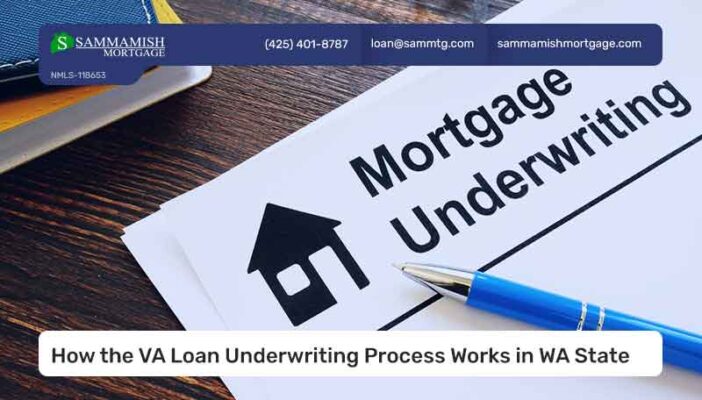No Obligation and transparency 24/7. Instantly compare live rates and costs from our network of lenders across the country. Real-time accurate rates and closing costs for a variety of loan programs custom to your specific situation.

VA loans are a popular financing option among military members and veterans across the state of Washington. This program allows borrowers to finance 100% of their home purchase without mortgage insurance. That’s a huge benefit when you consider the average cost of a home in Washington.
There are several critical stages along the path to VA loan approval and closing. Mortgage underwriting is one of these important stages.
Given the perks of this type of home loan, many homebuyers may be wondering how the VA loan underwriting process works. In this guide, we will walk through the different steps in the VA loan underwriting process and explain what borrowers can do to help keep that process on track.
Mortgage underwriting is the process through which a lender assesses your financial situation and the property you want to buy, to determine whether to approve you for a loan.
Underwriters look at various factors, including your credit history, income, debt, and the property’s appraised value. They want to make sure that you are likely to be able to repay the loan and that the property is a good investment.
To put this into perspective, let’s zoom out and look at the broader home-buying process when a VA loan is used.
Here are the basic steps that take place when a person buys a home in Washington using a VA-guaranteed mortgage loan:
VA loan underwriting takes place after the home appraisal and before closing. That’s because the underwriter has to review the appraisal report (along with the other “loan docs”) to determine if the borrower can move on to closing.
Mostly, the underwriting process works the same whether a borrower is using a conventional, FHA, or VA loan. However, there are some differences regarding documentation and property-related requirements.
For instance, any home purchased with a VA loan must be appraised to determine its market value. The appraiser must also ensure that the residence meets the minimum property requirements set forth by the U.S. Department of Veterans Affairs.
The underwriter will review the appraisal to ensure it checks all the appropriate boxes.
With a conventional mortgage loan, on the other hand, the home appraiser is solely focused on determining the market value of the property. There aren’t any minimum property requirements to worry about, as there are with VA loans. So, the underwriting process works differently as well.
If you’re wondering, “How long does the underwriting process take on VA loans?” you’ll find the answer varies quite a bit depending on the specific situation.
That said, the underwriting process typically takes a few weeks to complete, given all the steps and tasks involved. If the loan needs to be manually underwritten, the process will take longer to accommodate the extra work involved.
Given this, it’s essential to factor in the time to complete the VA loan process before your mortgage and real estate deal closes.
The VA loan underwriting process also uses its own unique software program. Lenders offering these loans typically use an “Automated Underwriting System” (AUS). This program evaluates a borrower’s eligibility for a VA loan based on various criteria.
The automated underwriting system offers several advantages, such as streamlining and expediting the VA mortgage underwriting process.
While many borrowers can obtain final approval through the automated system, some require a more stringent manual review process.
If a borrower is not accepted through AUS due to their higher level of risk, then their loan will undergo manual underwriting. In other words, an actual person will be involved in manually reviewing the file.
Generally speaking, manual underwriting for a VA loan may be necessary under the following circumstances:
It’s important to note, however, that a manual underwriting process won’t necessarily mean that a borrower will be denied a VA loan. More work may be required to vet the borrower and ensure they can handle a mortgage with little risk of default.
While manual underwriting may equate to more stringent criteria, it does not mean the borrower will not get approved as long as everything checks out according to the lender.
VA mortgage underwriters scrutinize all aspects of the loan file to ensure the lender makes a sound investment. In a typical home purchase in the state of Washington, the lender will initially invest more money than the borrower does. So, the mortgage lender wants to make sure they are making a sound investment.
As stated on the Department of Veterans Affairs website:
“By law, VA may only guarantee a loan when it is possible to determine that the Veteran is a satisfactory credit risk and has present or verified anticipated income that bears a proper relation to the anticipated terms of repayment.”
The VA home loan underwriting process can vary slightly from one transaction to the next among different lenders. Generally, the underwriter will perform the following tasks:
Related: 5 Bennefits of using a VA Loan in WA State
While much of the VA loan mortgage underwriting process occurs “behind the scenes,” there are instances where the home buyer can help keep things on track.
If the underwriter requests additional information from you, respond promptly to prevent delays. For instance, a “letter of explanation” might be needed regarding a financial transaction, such as a large bank deposit or withdrawal. This is a common request during the VA loan underwriting process.
The underwriter might also request additional information about your employment status, income, assets, and other essential checkpoints.
Knowing how the VA loan underwriting process works is very helpful for borrowers looking to apply for this type of mortgage to buy a home. Communication and coordination can keep the process on track. So stay in touch with your mortgage company’s point of contact to ensure they have everything they need to complete the process.


Whether you’re buying a home or ready to refinance, our professionals can help.
{hours_open} - {hours_closed} Pacific
No Obligation and transparency 24/7. Instantly compare live rates and costs from our network of lenders across the country. Real-time accurate rates and closing costs for a variety of loan programs custom to your specific situation.